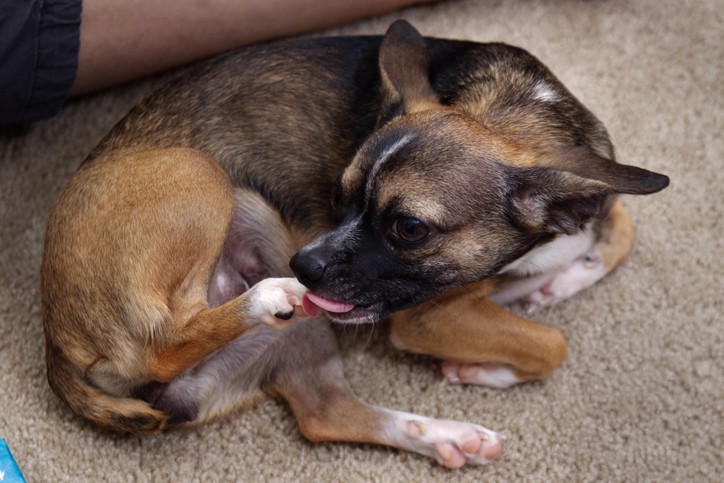
Why is My Dog Licking Their Paws?
Has your dog been licking their paws obsessively? Is this a cause for concern? When should you worry about constant paw licking behavior in your pet?
All dogs lick their paws now and then, and this is a normal part of being a dog. However, there are some situations in which paw licking may indicate a more concerning underlying problem. In the article below, we’ll help you learn more about paw licking behavior in your dog, and we’ll make it easier for you to understand when this behavior may need to be treated by a vet. Read on to find out more.
Cleaning
The first and most common cause of paw licking in dogs is cleaning. Although dogs do not lick themselves clean like cats do, they may still try to lick away debris and contaminants on their skin and in their hair, especially if the debris is causing any irritation.
If your dog’s paw licking resolves itself in a day or less, they may just have something in their fur that they didn’t like. However, if it continues for longer than a day, then chances are good your dog isn’t just cleaning their paw.
Pain
Dogs may suffer from paw pad and foot pain for a variety of reasons. Arthritis is one common cause of this type of pain in dogs. Additionally, if your dog’s nail becomes broken or gets pulled out, this can cause severe pain too.
Dogs who are in pain typically lick and chew at the location that is causing the pain. If you think your dog is hurting and is licking their paw to soothe pain, you may need to call your veterinarian to examine the foot for any breaks or damage you can’t see on the surface.
Insect Bites and Stings
It is very common for dogs to be bitten or stung by insects—and snakes—on the paws and feet. A dog who is obsessively licking and chewing their paws may be trying to soothe the pain and irritation caused by this type of bite or sting.
Check your dog’s paw pads carefully for any signs of a bite or sting. If you know or suspect that your pet has been bitten or stung recently, watch closely for signs of a serious allergic reaction, such as swelling of the face or neck. If you do not see these signs, however, you can typically let the problem resolve on its own.
Fungal Infection
Fungal infections are common causes of excessive paw licking in dogs. These infections may occur when a dog’s hair becomes overly wet or matted and stays close to the skin for too long. Fungus becomes trapped against the skin and contributes to an outbreak of a fungal infection.
These infections can be quickly and easily treated with the help of your vet. Your dog will need topical ointment to recover from the fungal infection and may need a round of antibiotics to prevent a secondary bacterial infection as well. They should be back to normal in a couple of weeks.
Tumors
Tumors of the feet and toes are not common, but they can still occur. It is possible that a dog who is constantly licking and chewing their paws may have this type of tumor. Unfortunately, tumors of the toes are typically a serious problem and often indicate cancer that has metastasized throughout the body already.
If you suspect your dog has a tumor on their foot or toe, talk to your veterinarian as soon as possible. The sooner you have an official diagnosis, the quicker you can try to choose the proper treatment for your pet.
Hot Spots
If your dog is licking their paws obsessively, pay special attention to the areas they are focusing on. If they are licking too much, your dog may cause a hot spot, which is an area of broken and infected skin often seen with patchy hair loss.
Hot spots are worsened by moisture, so a dog who licks the hot spot may get into a cycle of recurring hot spots over time. Talk to your vet about treatments for this problem and keep in mind that your dog may need to wear an e-collar for a while to prevent further licking.
Talk with Your Boston Veterinary Clinic About Your Paw’s Licking
Based on this information, it’s easy to see just how quickly paw licking can turn into a problem, and how often it is associated with underlying issues too. Despite these concerns, however, paw licking on its own is not typically a major issue, and you likely don’t have to rush your pet off to the emergency vet to deal with paw licking.
If your dog’s paw licking behavior lasts longer than a day or two, or if it is associated with other symptoms, then book an appointment online and take them to the your Boston Veterinary Clinic vet as soon as possible.